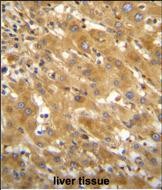GLUD1 Antibody (C-term)
Affinity Purified Rabbit Polyclonal Antibody (Pab)
- SPECIFICATION
- CITATIONS: 2
- PROTOCOLS
- BACKGROUND

Application
| WB, IHC-P, E |
|---|---|
| Primary Accession | P00367 |
| Other Accession | P49448, P10860, P26443, P00368, P00366, NP_005262.1, Q6P3L9, P42174 |
| Reactivity | Human, Mouse |
| Predicted | Zebrafish, Bovine, Chicken, Pig, Rat |
| Host | Rabbit |
| Clonality | Polyclonal |
| Isotype | Rabbit IgG |
| Calculated MW | 61398 Da |
| Antigen Region | 438-465 aa |
| Gene ID | 2746 |
|---|---|
| Other Names | Glutamate dehydrogenase 1, mitochondrial, GDH 1, GLUD1, GLUD |
| Target/Specificity | This GLUD1 antibody is generated from rabbits immunized with a KLH conjugated synthetic peptide between 438-465 amino acids from the C-terminal region of human GLUD1. |
| Dilution | WB~~1:1000 IHC-P~~1:50~100 E~~Use at an assay dependent concentration. |
| Format | Purified polyclonal antibody supplied in PBS with 0.09% (W/V) sodium azide. This antibody is purified through a protein A column, followed by peptide affinity purification. |
| Storage | Maintain refrigerated at 2-8°C for up to 2 weeks. For long term storage store at -20°C in small aliquots to prevent freeze-thaw cycles. |
| Precautions | GLUD1 Antibody (C-term) is for research use only and not for use in diagnostic or therapeutic procedures. |
| Name | GLUD1 |
|---|---|
| Synonyms | GLUD |
| Function | Mitochondrial glutamate dehydrogenase that catalyzes the conversion of L-glutamate into alpha-ketoglutarate. Plays a key role in glutamine anaplerosis by producing alpha-ketoglutarate, an important intermediate in the tricarboxylic acid cycle (PubMed:11032875, PubMed:11254391, PubMed:16023112, PubMed:16959573). Plays a role in insulin homeostasis (PubMed:11297618, PubMed:9571255). May be involved in learning and memory reactions by increasing the turnover of the excitatory neurotransmitter glutamate (By similarity). |
| Cellular Location | Mitochondrion. Endoplasmic reticulum. Note=Mostly translocates into the mitochondria, only a small amount of the protein localizes to the endoplasmic reticulum. |

Provided below are standard protocols that you may find useful for product applications.
Background
This gene encodes glutamate dehydrogenase protein; a mitochondrial matrix enzyme that catalyzes the oxidative deamination of glutamate to alpha-ketoglutarate and ammonia. This enzyme has an important role in regulating amino acid induced insulin secretion and activating mutations in this gene are a common cause of congenital hyperinsulinism. This enzyme is allosterically activated by ADP and inhibited by GTP and ATP. The related glutamate dehydrogenase 2 gene on the human X-chromosome originated from this gene via retrotransposition and encodes a soluble form of glutamate dehydrogenase. Multiple pseudogenes of this gene are present in humans.
References
Martins-de-Souza, D., et al. J Psychiatr Res 44(14):989-991(2010)
Jia, P., et al. Schizophr. Res. 122 (1-3), 38-42 (2010) :
Joslyn, G., et al. Alcohol. Clin. Exp. Res. 34(5):800-812(2010)
Flanagan, S.E., et al. Eur. J. Endocrinol. 162(5):987-992(2010)
Bao, X., et al. J. Neurosci. 29(44):13929-13944(2009)
If you have used an Abcepta product and would like to share how it has performed, please click on the "Submit Review" button and provide the requested information. Our staff will examine and post your review and contact you if needed.
If you have any additional inquiries please email technical services at tech@abcepta.com.














 Foundational characteristics of cancer include proliferation, angiogenesis, migration, evasion of apoptosis, and cellular immortality. Find key markers for these cellular processes and antibodies to detect them.
Foundational characteristics of cancer include proliferation, angiogenesis, migration, evasion of apoptosis, and cellular immortality. Find key markers for these cellular processes and antibodies to detect them. The SUMOplot™ Analysis Program predicts and scores sumoylation sites in your protein. SUMOylation is a post-translational modification involved in various cellular processes, such as nuclear-cytosolic transport, transcriptional regulation, apoptosis, protein stability, response to stress, and progression through the cell cycle.
The SUMOplot™ Analysis Program predicts and scores sumoylation sites in your protein. SUMOylation is a post-translational modification involved in various cellular processes, such as nuclear-cytosolic transport, transcriptional regulation, apoptosis, protein stability, response to stress, and progression through the cell cycle. The Autophagy Receptor Motif Plotter predicts and scores autophagy receptor binding sites in your protein. Identifying proteins connected to this pathway is critical to understanding the role of autophagy in physiological as well as pathological processes such as development, differentiation, neurodegenerative diseases, stress, infection, and cancer.
The Autophagy Receptor Motif Plotter predicts and scores autophagy receptor binding sites in your protein. Identifying proteins connected to this pathway is critical to understanding the role of autophagy in physiological as well as pathological processes such as development, differentiation, neurodegenerative diseases, stress, infection, and cancer.



